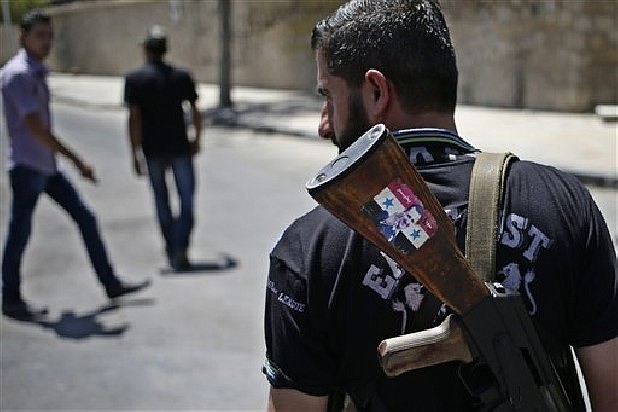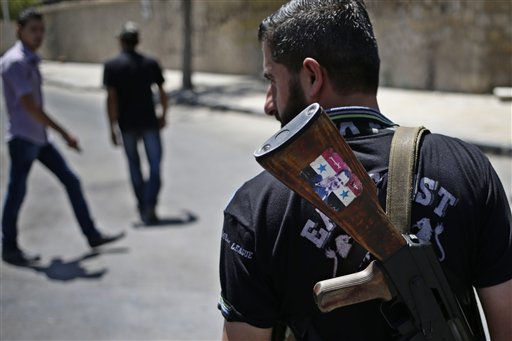WASHINGTON - President Barack Obama asked Congress Thursday for $500 million to train and arm vetted members of the Syrian opposition, as the U.S. struggles for a way to stem a civil war that has also fueled the al-Qaida inspired insurgency in neighboring Iraq.
The military training program would deepen the Obama administration's involvement in the more than four-year conflict between rebels and forces loyal to Syrian President Bashar Assad. If approved by Congress, the program would supplement a covert train-and-assistance program run by U.S. intelligence agencies.
The Syria program is part of a broader $65.8 billion overseas operations request that the administration sent to Capitol Hill Thursday. The package includes $1 billion to help stabilize nations bordering Syria that are struggling with the effects of the civil war. It also formalizes a request for a previously announced $1 billion to strengthen the U.S. military presence in Central and Eastern Europe amid Russia's threatening moves in Ukraine.
The requests come as Obama faces fresh criticism of his restrained policies in Syria, which some White House opponents contend allowed the Sunni insurgency pressing through Iraq to gain strength. U.S. officials increasingly see the instability in Syria and Iraq as a single challenge, with the border between the two countries increasingly blurred.
Obama hinted earlier this year that he was seeking ways to boost assistance to moderate Syrian rebels who are struggling to make gains in their clashes with Assad's forces.
"In helping those who fight for the right of all Syrians to choose their own future, we also push back against the growing number of extremists who find safe haven in the chaos," Obama told graduating cadets during a May 28 commencement address at West Point.
Officials said the administration would coordinate with Congress and regional players on the specific types of training and assistance the U.S. would provide the opposition. One potential option would be to base U.S. personnel in Jordan and conduct the training exercise there.
The Senate Armed Services Committee has already approved a version of the sweeping defense policy bill authorizing the Defense Department to provide "equipment, supplies, training and defense services" to elements of the Syrian opposition that have been screened. The Senate could act on the bill before the August recess.
In addition to the covert train-and-equip mission, the U.S. has also provided nearly $287 million in nonlethal assistance to the moderate opposition.
The military program would be supplemented by $1 billion in assistance to Syria's neighbors - Jordan, Lebanon, Turkey, and Iraq - to help them deal with an influx of refugees and the threat of extremists spilling over their borders.
Iraq in particular is buckling amid lightening gains by the Sunni extremist group Islamic State of Iraq and the Levant, which also has a stronghold inside Syria. The group has seized large swaths of Iraq and seeks to carve out a purist Islamic enclave across both sides of the Syria-Iraq border.
The instability in Iraq comes as Obama continues to grapple with a crisis in Ukraine, with Russia widely believed to be backing pro-Moscow insurgents in eastern Ukrainian cities. Russia's threats have stoked anxiety among U.S. allies in the region, who are seeking deeper military assistance from the U.S.
The overseas contingency requests includes a $1 billion program that would increase the U.S. military presence in Central and Eastern Europe, boost training exercises with allies and allow the Pentagon to position equipment in the region. Obama announced the program during a trip to Poland earlier this month.
The total overseas contingency package is about $21 billion less than the administration said it expected to request when Obama submitted his fiscal year 2015 budget to Congress earlier this year. Officials said the decrease is in part of reflection of Obama's plans to drawdown the U.S. military presence in Afghanistan to about 10,000 forces by the beginning of next year.
Obama is still waiting for the Afghan government to sign a security agreement with the U.S. that would allow those forces to stay.
In Congress, some lawmakers have looked at the overseas account as a source of cash as the Pentagon has been forced to cut its core budget. The House's version of the sweeping defense policy bill for next year shifts some $600 million from the overseas account to spare the A-10 Warthog, the close air support aircraft that has a strong coalition of Republican and Democratic support on Capitol Hill.

